Update:Τα 18.
Update:Τα 18.
*Η στιγμή που το κορίτσι που ήμουν στα 16 μου,άλλαξε στα 17 για να καταλήξει αυτό που είναι στα (τόσο κοντινά)18 μου.
Υπάρχουν ακόμα μέρες που κλαις για καταστάσεις και πρόσωπα του παρελθόντος,μέρες που δε θες να σηκωθείς καν από το κρεβάτι,που θες για λίγο απλά να υπάρχεις στον χώρο,χωρίς όμως να κάνεις τίποτα.
Αλλά:Οι μέρες εκείνες είναι τόσο λίγες,μπροστά σε εκείνες που νιώθεις ευγνώμων για ό,τι έχεις καταφέρει ως τώρα.
Ένα αγόρι θα σου πει πόσο του αρέσουν τα μακρυά μαλλιά σου γιατί “αυτά ταιριάζουν στις κοπέλες”.Και τότε αποφασίζεις να κάνεις αυτό που ήθελες τόσο καιρό αλλά δίσταζες:τα κόβεις.Δε σε νοιάζει τόσο πια η γνώμη των άλλων.Έτσι τολμάς κι εκείνα τα piercing και φοράς πλεον ό,τι αρέσει σε εσένα γιατί πια δε σε αφορά η μόδα.Νιώθεις μια περίεργη μορφή εσωτερικής ελευθερίας.
Έκανες κάποιους λάθος χειρισμούς.Θα συνεχίσεις να κάνεις.Αλλά πλεον έχεις μάθει να σε συγχωρείς και όχι να σε καταδικάζεις.Έπαψες πια να ανακυκλώνεις τις αρνητικές αυτές σκέψεις στο μυαλό σου.
Συνηθίζουν(λανθασμένα) να λένε ότι η ωριμότητα πάει με την ηλικία.Έτσι θα χάσεις λίγο την ανεμελειά σου γιατί ένας μελλοντικός ενήλικας έχει περισσότερες ευθύνες απο τον 16χρονο εαυτό σου.Θα αρχίσει σιγά σιγά να σβήνεται το χαμόγελό σου και τη θέση του να παίρνει ένα πρόσωπο βουτηγμένο στις υποχρεώσεις.Μην επιτρέψεις να χαθεί αυτό το παιδί από μέσα σου.
Διαφώνησες αρκετά αυτά τα δύο χρόνια και έχασες άτομα.Κάποια μάλιστα ήταν σημαντικά για εσένα.
Αλλά: Κέρδισες εσένα και δεν επέτρεψες σε κανέναν να σε αλλάξει.Και δεν μπορώ να φανταστώ μεγαλύτερη νίκη από αυτήν εδώ.
Συνειδητοποίησες την προσωρινότητα των καταστάσεων και κατάλαβες ότι οι άνθρωποι δε μπορούν να μείνουν για πάντα.Βέβαια,είμαστε κι εμείς οι ίδιοι που αποχωρούμε κάποιες φορές.
Τελικά έκανες πράγματα που ισχυριζόσουν ότι δε θα κάνεις ποτέ.Κάποια μάλιστα τα επανέλαβες διότι σου άρεσε η γλύκα της “αμαρτίας”.Έτσι,ήπιες λίγο παραπάνω και δε γύρισες σπίτι την ώρα που είχες υποσχεθεί.Ή μάλλον ίσως και να μη γύρισες καθόλου.Ανοίχτηκες σε άτομα που δεν περίμενες ότι θα ερχόσασταν τόσο κοντά και τόλμησες επιτέλους να φύγεις από καταστάσεις που για χρόνια σε έπνιγαν.Έσπασες τους κανόνες για ό,τι ποθούσε ανέκαθεν η καρδιά σου.Διεκδίκησες,υποτιμήθηκες,πόνεσες,κέρδισες αυτό που επιθυμούσες,αλλά έμαθες και να χάνεις.
Πλήγωσες και πληγώθηκες παραπάνω απ’ όσο πίστευες ότι θα αντέξεις.Και όμως,να ‘σαι εδώ.Ακόμα πιο δυνατή.Ακόμα πιο εντάξει με την ιδέα ότι έσφαλες.
Αλλά: Ακόμα πιο σίγουρη ότι δε γίνεται να φταις για όλα εσύ.
Η ευτυχία σου δεν εξαρτάται πια από κανέναν άνθρωπο.Η ευτυχία σου καθορίζεται από εσένα.Και δεν ξέρεις πόσο υπέροχο είναι αυτό.
Χρειάστηκε να πεις πολλές φορές ένα μεγάλο “Άντε στο διάολο” σε καταστάσεις που δεν οδηγούν πουθενά.Κι έτσι,προχώρησες σε νέα πράγματα,καλύτερα.
Παρέμεινες ζωντανή κι έφτασες μέχρι εκεί που δε μπορούσες καν να φανταστείς ότι θα καταφέρεις να φτάσεις ποτέ.Τα μαύρα σύννεφα έφυγαν.
Έφαγες λίγο παραπάνω και δεν κοιμήθηκες καθόλου κάποια βράδια.Ξενύχτησες.Απέκτησες μαύρους κύκλους και ραγάδες.Ψήλωσες.Πάχυνες και αδυνάτησες.Και κάπως έτσι έμαθες λίγο παραπάνω να σε αγαπάς.
Τωρινέ μου εαυτέ,είμαι περήφανη για εσένα.
Υ.Γ.:Σε όποιον νιώθει ότι δε θα φτάσει μέχρι τα 18,διότι δεν αντέχει άλλο:Ο πόνος αυτός είναι προσωρινός και όλα εκείνα που σε περιμένουν τόσο μεγάλα που αξίζει να παλέψεις γι'αυτά.Τις πιο όμορφες μέρες δεν τις έχεις ζήσει ακόμα.Τα λέμε.
More Posts from Tipsorina and Others
The Song of Achilles, Madeline Miller

Rating: No Good Genre: Fantasy Representation: Gay men, Greek/Mediterranean cast Trigger Warnings: rape, rape culture, explicit sex scenes, child sexualization, exotified ethnicity, character death
I stopped reading The Song of Achilles a third of the way through. I started the novel with high hopes, as The Song of Achilles promised to be an exploration of the romantic relationship between Achilles and Patroclus—taking what The Iliad only implied and putting it to paper.
Here’s what I was hoping for: an honest exploration of the ancient Greek conception of sexuality, taking into account that homoeroticism that we today would call “homosexual” was not considered part of one’s sexual identity, simply what one did (in addition to taking a wife, of course). What would a boy growing up in (mythical) ancient Greece, a land where even Zeus took male lovers, think about his own romantic and sexual desires? Does he desire only men (in The Song of Achilles this is true of both Achilles and Patroclus), and what does that mean for him personally, as compared to what it would mean for us today?
Here’s what I got: The Song of Achilles reads very much like the erotic fantasy of a straight woman about gay men. I was made personally uncomfortable, especially considering how young the characters are in the first 3rd of the book (9-16). The Song of Achilles revisits tired tropes that seem very out of place in the ancient Greek setting–a culture notorious for its fluid sexuality. Thetis (Achilles’ mother) behaves more like a small town republican than a goddess. She’s upset that Achilles and Patroclus kiss and makes it her mission to separate them. This makes absolutely no sense considering that, as a goddess, she should be above the petty who’s-kissing-who of mortals, and makes even less sense when you consider that Zeus himself took male lovers. The bigotry is only included in the text because Miller has no idea how to deal with queer characters outside of the angst of the present day. I was expecting this story to at least acknowledge that ancient Greece is not the same as Victorian England just because both periods happened out of living memory.
Neither Achilles nor Patroclus consider themselves as part of a greater social context. If Patroclus really had exclusive feelings towards men, there would be some internal narrative exploring how he feels about his feelings–how does he see himself fitting into his culture? Instead, the entire narrative focuses on the external–how attractive Achilles is, and the external consequences for their relationship (such as the disapproval of Achilles’ mother). This is what really convinced me that this book was written for straight readers. A coming of age story about queer children, yet they spare no thought for their own identities? No thoughts of the future, or considerations of whether there are others like them? I would have been incredibly interested in a well-researched novel which explores the unique challenges (and enjoyment!) of queerness in an ancient context. That would have been a truly unique novel. The Song of Achilles, however, reads like Miller read one Alex Sanchez novel and thought she was somehow qualified to write this book.
Further, Miller struggles with separating her own voice from the voice of her first person narrator, which makes for some very uncomfortable narration surrounding the bodies of 9-13 year old children. Patroclus, 9 at the time, describes Achilles as “still plump with childhood” and with “hair lit like honey in the sun.” Later, at 13, Achilles is “supple.” This is the language not of a child, but of an adult observing childhood. A child would never say another child their age was “still plump with childhood.” Patroclus’ voice gets lost in Miller’s desire to write in a sophisticated style, which has the horrible repercussion of making her novel voyeuristic.
Related to this is the fact that Miller exotifies the nationalities of her characters. Everyone has “skin the color of freshly pressed olive oil” which is so silly coming from the point of view of Patroclus, who has grown up seeing Mediterranean people all his life–and looking just like them. Frankly, it’s racist. It’s a white woman looking in and impressing her own observations, not the observations of a young Greek boy, on the narrative. Some further racism: Achilles, hyperattractive demi-god that he is, is portrayed as “whiter” than everyone else–and his beauty is almost always described by the color of his “golden” skin. His hair is honey and his eyes are green, in contrast to the dark eyes and the “nut-brown” bodies of the rest of the Greeks.
So, not only is The Song of Achilles a disappointment for queer readers looking for good representation, it’s not that well written, constantly breaking point of view to give us an uncomfortable dose of child sexualization and racism. The premise of this novel had a lot of potential, but Miller couldn’t follow through with an inoffensive execution.
For more info on Madeline Miller, here’s her website



A floating market is a market where goods are sold from boats. Originating in times and places where water transport played an important role in daily life, most floating markets operating today mainly serve as tourist attractions, and are chiefly found in Thailand,Indonesia and Vietnam. (Source)


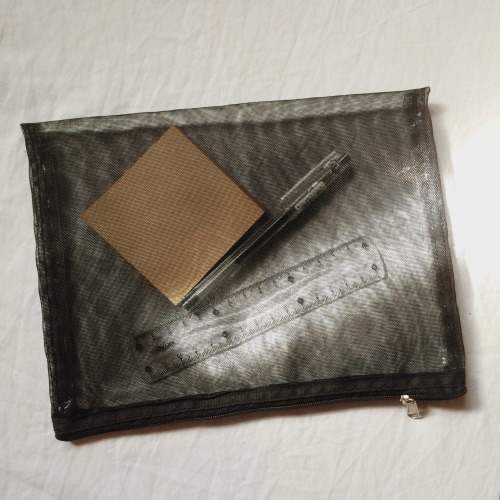
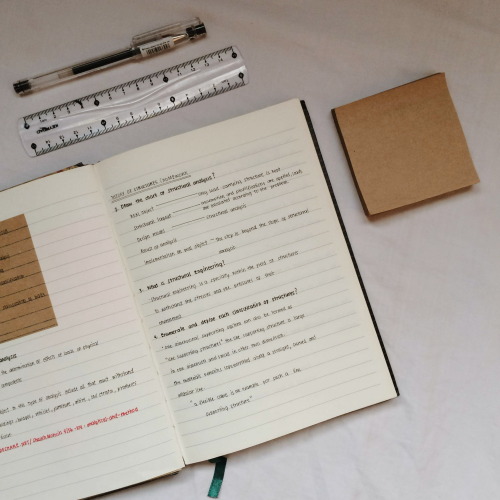
Minimal study


Source: 1 2 3 4 5 6 If you want more facts, follow Ultrafacts
Why is this turtle being mobbed by fish?
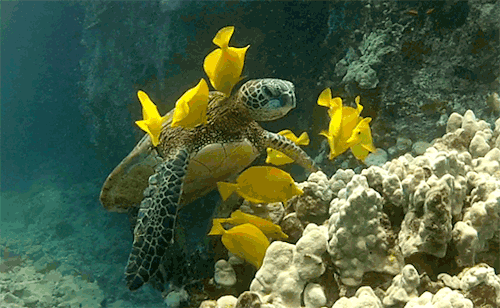
A few months ago while researching in Hawaiian Islands Humpback Whale National Marine Sanctuary, NOAA diver Mitchell Tartt caught this turtle on camera. Although they may seem like paparazzi swarming this green sea turtle, the yellow tang here are actually doing the turtle a favor.
Over time, turtles and other marine animals accumulate algae and parasites and small invertebrates. But to the yellow tangs and other fish, those parasites are something entirely different: a meal.
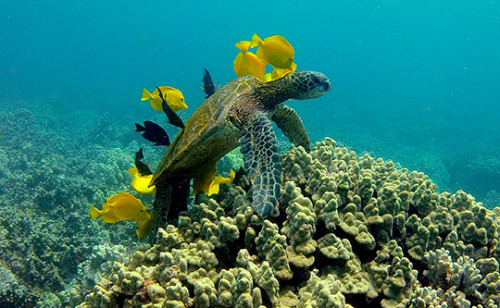
These fish gather throughout Hawaiian Islands Humpback Whale National Marine Sanctuary in what are known as “cleaning stations.” When the sea turtle swims up, the fish surround it – it’s dinner time!
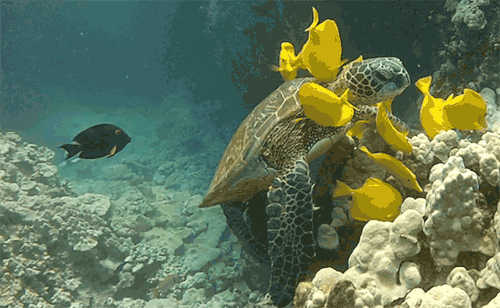
This relationship is just one example of a type of symbiosis in the ocean, called mutualism, in which animals of different species form relationships that benefit them both. Many sea creatures depend on symbiotic relationships to survive, from sea anemones and clownfish, to corals and zooxanthellae, to remoras and sharks.
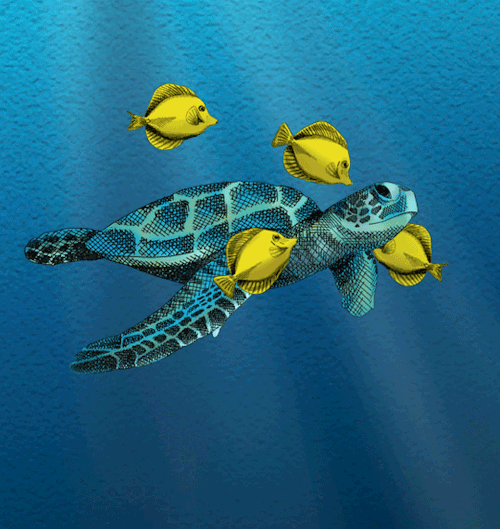
What’s your favorite example of symbiosis in the ocean?
Badass Playlist
(The playlist you need to play when you feel like you need 50 strippers backing you and angels with hair as high as the heavens (hair metal bands)) (This also works great to drive to)
1) Wild Side–Mötley Crüe
2) Hunger–King Kobra
3) Breathless–Quiet Riot
4) The Wild and the Young–Quiet Riot
5) Shout at the Devil–Mötley Crüe
6) Girls, Girls, Girls–Mötley Crüe
7) Sumthin’ for Nothin’–Mötley Crüe
8) Highway Tune–Greta Van Fleet
9) Uncle Tom’s Cabin–Warrant
10) Nobody’s Fool–Cinderella
11) Cherry Pie-Warrant
12) Kickstart my Heart–Mötley Crüe
13) Push, Push–Cinderella
14) Gypsy Road–Cinderella
15) Dancing on Glass–Mötley Crüe
16) Still of the Night–Whitesnake
17) Shake Me–Cinderella
18) Let’s Get Crazy–Quiet Riot
19) St. John–Aerosmith
20) All in the Name Of…–Mötley Crüe (Even though the lyrics are quite questionable)
21) Looks that Kill–Mötley Crüe
22) Ten Seconds to Love–Mötley Crüe
23) Hell on Wheels–Cinderella
24) Somebody Save Me–Cinderella
25) Put Up or Shut Up–Quiet Riot

#justiceformuslims

all this discourse about how to spell vergil…if ur not on a first name basis with ol publius then why are you even bothering
-
 to-tumbler-einai-gtp liked this · 1 year ago
to-tumbler-einai-gtp liked this · 1 year ago -
 its-jst-mee liked this · 5 years ago
its-jst-mee liked this · 5 years ago -
 bojorina reblogged this · 5 years ago
bojorina reblogged this · 5 years ago -
 tipsorina reblogged this · 5 years ago
tipsorina reblogged this · 5 years ago -
 xanomauy liked this · 5 years ago
xanomauy liked this · 5 years ago -
 passionataly reblogged this · 5 years ago
passionataly reblogged this · 5 years ago -
 xioumwrakii liked this · 5 years ago
xioumwrakii liked this · 5 years ago -
 skatoulesmplekaramele reblogged this · 5 years ago
skatoulesmplekaramele reblogged this · 5 years ago -
 skatoulesmplekaramele liked this · 5 years ago
skatoulesmplekaramele liked this · 5 years ago -
 pareisakti reblogged this · 5 years ago
pareisakti reblogged this · 5 years ago -
 tipota-67-blog liked this · 6 years ago
tipota-67-blog liked this · 6 years ago -
 zennnzen reblogged this · 6 years ago
zennnzen reblogged this · 6 years ago -
 basiampk reblogged this · 6 years ago
basiampk reblogged this · 6 years ago -
 basiampk liked this · 6 years ago
basiampk liked this · 6 years ago -
 alwayschasingfire liked this · 6 years ago
alwayschasingfire liked this · 6 years ago -
 skotwnw-asterakia liked this · 6 years ago
skotwnw-asterakia liked this · 6 years ago -
 mantissaaaa reblogged this · 6 years ago
mantissaaaa reblogged this · 6 years ago -
 natassasrm reblogged this · 6 years ago
natassasrm reblogged this · 6 years ago -
 xaliemai liked this · 6 years ago
xaliemai liked this · 6 years ago -
 pareisakti reblogged this · 6 years ago
pareisakti reblogged this · 6 years ago -
 lux-in-tenebriss reblogged this · 6 years ago
lux-in-tenebriss reblogged this · 6 years ago -
 gia-ayta-pou-niwthw-fevgw reblogged this · 6 years ago
gia-ayta-pou-niwthw-fevgw reblogged this · 6 years ago -
 anasfa-leies liked this · 6 years ago
anasfa-leies liked this · 6 years ago -
 apaisio-dokso-s liked this · 6 years ago
apaisio-dokso-s liked this · 6 years ago -
 niwse-me-h-pethane-blog reblogged this · 6 years ago
niwse-me-h-pethane-blog reblogged this · 6 years ago -
 mikripatrida liked this · 6 years ago
mikripatrida liked this · 6 years ago -
 whoriblee liked this · 6 years ago
whoriblee liked this · 6 years ago -
 madebylight47 liked this · 6 years ago
madebylight47 liked this · 6 years ago -
 anmpasworld liked this · 6 years ago
anmpasworld liked this · 6 years ago -
 monimhgkriniaa liked this · 6 years ago
monimhgkriniaa liked this · 6 years ago -
 rainbowdes reblogged this · 6 years ago
rainbowdes reblogged this · 6 years ago -
 rainbowdes liked this · 6 years ago
rainbowdes liked this · 6 years ago -
 efiask reblogged this · 6 years ago
efiask reblogged this · 6 years ago -
 efiask liked this · 6 years ago
efiask liked this · 6 years ago -
 nightwinglostforever reblogged this · 6 years ago
nightwinglostforever reblogged this · 6 years ago -
 nightwinglostforever liked this · 6 years ago
nightwinglostforever liked this · 6 years ago -
 exasa-to-mualo-mou liked this · 6 years ago
exasa-to-mualo-mou liked this · 6 years ago -
 saddnessworldd liked this · 6 years ago
saddnessworldd liked this · 6 years ago -
 sexexasa liked this · 6 years ago
sexexasa liked this · 6 years ago -
 okosmosdenallazei-blog liked this · 6 years ago
okosmosdenallazei-blog liked this · 6 years ago -
 den-eimai-edw liked this · 6 years ago
den-eimai-edw liked this · 6 years ago -
 sovagiann liked this · 6 years ago
sovagiann liked this · 6 years ago -
 mahinaaa reblogged this · 6 years ago
mahinaaa reblogged this · 6 years ago -
 mahinaaa liked this · 6 years ago
mahinaaa liked this · 6 years ago -
 fadedroses123 liked this · 6 years ago
fadedroses123 liked this · 6 years ago -
 xwris-kanenan-blog liked this · 6 years ago
xwris-kanenan-blog liked this · 6 years ago -
 temperamentales reblogged this · 6 years ago
temperamentales reblogged this · 6 years ago
